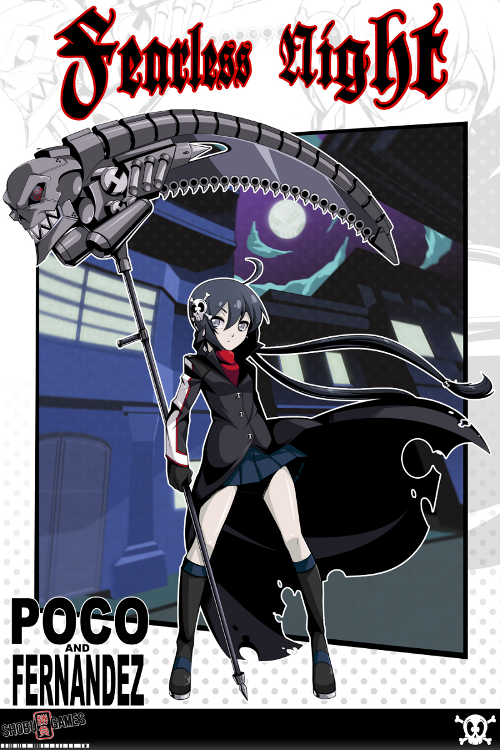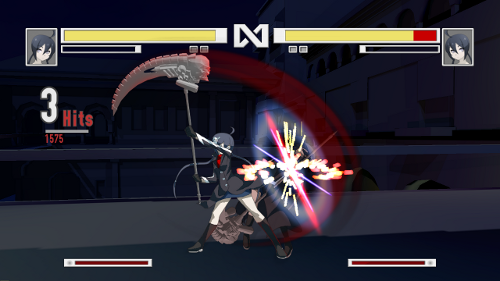Have you heard of Fearless Night? I certainly didn’t, but that shows the power of a convention open to the public (and whoever pays enough money for a booth) – you never know what you might find. So it was that a fighting game (!) appeared before me, and it wasn’t long before I played it and talked to the developers at Shobu Games. Also, when I saw a Street Fighter Tournament Edition stick and a…wait for it…Hori Real Arcade Pro 2 (with the blue buttons!), I knew these guys were serious.
Fearless Night takes after the much-beloved (in the fighting game community, anyway) Guilty Gear series, with its fast-paced “anime fighter” aesthethic. You know the drill – airdashes and fast mixups aplenty assault the player, and the game constantly encourages a focus on complete and total offense to win. Chase LaCas, the lead programmer and game designer, made it clear that he wanted to make the game a great deal like his own favorites such as Vampire Savior and the aforementioned Guilty Gear. Fighting games, for lack of better terminology, became slow and sluggish at some point for the purpose of accessibility. Mr. LaCas wants to bring back a more traditional, but fluid and fast, fighting game into the mix while removing the bad elements of their modern incarnations.
Specifically, the much-praised “comeback mechanics” such as Street Fighter IV’s Ultras and Marvel vs. Capcom 3’s X-Factor will not be making any appearance in Fearless Night. For the people at Shobu Games, these do not represent a real match element; maybe they make the match more exciting, and certainly inspire crowds at various tournaments (myself included), but they don’t show an opponent of skill winning through skill. I’m sure anyone playing these games online saw one person or another throw out these moves for no other reason than they can, and eke out a victory. Surely it’s not an issue at higher levels of play, where people aren’t trained on such mechanics, but it does hamper the learning process for beginners and intermediate level play. I haven’t played fighting games long enough to make a good judgment on this, but I assume many older players know that it inevitably leads to problems, so I will defer to the experts on this point.
Furthermore, Shobu Games wants to make this fast game type more accessible to the general player. Most games of this type keep a “Roman Cancel” style mechanic for the purpose of confusing the opponent. Roman Cancels, in the case of Guilty Gear, allow you to cancel an attack immediately on any frame of its animation after said attack hits and whether or not it’s blocked. This allows you to combo into attacks that wouldn’t normally be possible (think Focus Dash Attack Cancel in SFIV, for instance, and you’re close to getting it). They cost 50% of your Tension Gauge, but they’re worth it if you can land a combo with that unpreditable offense provided by RCs. Now, False Roman Cancels (the name makes no sense, but bear with the Japanese-style terminology) allow you to cancel specific attacks for the cost of 25% meter. This is a huge boon and allows you to use your meter for other purposes, but FRCs require a 2-frame input windows. Yes, when I’m referring to frames, I totally mean “60 frames per second”, meaning your timing must hit three buttons simultaneously in 1/30th of a second after performing a special move (usually).
Unless you practice A LOT, and then get over your own nerves and developing precise muscle memory, you ain’t pulling that out in the middle of a match. Fearless Night does not want to impose such a crazy thing onto a player – rather, they will reduce the timing required for such a thing so that normal human beings can perform them without spending so much time. It strikes me as a similar impulse to David Sirlin, who doesn’t believe executional barriers add anything to the strategy of a game – they just make execution part of the play requirement:
The thing is, “execution” in general (not these very specific examples) has the opposite effect and it reduces strategy, relatively speaking. The more a game is about the difficulty of making your character do what you want to do, the necessarily less it is about strategy (that is, making good decisions).
This is why it’s not a good idea to make special moves really hard to do. Make them take some *time* so some prediction is needed (even a few frames of prediction), yeah that’s great. Make them start at a particular place on the joystick, such as a reverse dragon punch, and that affects how they’re used, right. But to have some tiny input window to make them hard to do even when you have decided you want to do them, that’s taking away emphasis on strategy. Making a game where the command to throw is secretly an option select tricky thing that you want to do basically always is another way to put more weight on dexterity that necessarily reduces strategy. Choosing commands that overlap too much (for example, ST Cammy’s hooligan throw and spinning knuckle) puts more emphasis on dexterity than the decision of choosing the right move. So to increase strategy slightly, it’s better to make those not overlap (and in HD Remix, they don’t).
Making a game such that bread-and-butter combos require 1-frame linking is another great example of reducing the importance of strategy. In a recent stream, Chen himself said that in SF4, if you can’t do Sakura’s 1-frame link combo, you shouldn’t be playing Sakura. I agree! That goes to show how strongly execution is favored over correct decision making / strategy in the case of SF4 Sakura.
This is good – very good! On the one hand, I’m a fighting game evangelizer – on the other hand, I don’t think countless hours should become a mandatory requirement for playing competently. I am, by training and by trade, a generalist and I do not focus on one genre over the others in the video game realm. I think we should work hard for victories in video games, but not to the point where it rises above hobby into complete and utter obsession. That’s where I see 2 Thessalonians 3 going:
10 For even when we were with you, we used to give you this order: if anyone is not willing to work, then he is not to eat, either. 11 For we hear that some among you are leading an undisciplined life, doing no work at all, but acting like busybodies. 12 Now such persons we command and exhort in the Lord Jesus Christ to work in quiet fashion and eat their own bread. 13 But as for you, brethren, do not grow weary of doing good.
Paul wants Christians to live dignified, quiet, and yet disciplined lives. There’s a time and a place for everything, and when that balance shifts too far to one side, you find yourself in a bad place. This applies to just about everything! That’s when it goes downhill at times. As long as you can make for accessibility without draining the pool (like that metaphor?), it will work – a tricky balance, but definitely doable. I have faith in Shobu Games to do it right, and their emphasis on involving the fighting game community helps them in this task. Unlike the big companies, you know you’re interacting directly in a three person team (an obvious advantage of the indie game).
Also, if you hadn’t guessed, the art style’s ripped from any number of Japanese games while not being designed by a Japanese person! Both of the people working on that art (honestly, still trying to find their full names is difficult at this point) did a great job so far, both conceptually and from a game standpoint, and I’m looking forward to seeing other character revealed and made known. With a roster of eight (at least planned), there should be unique designs and character types within that seemingly small roster (reminds me of Skullgirls a bit!).
All in all, Fearless Night looks quite good for its early status, and you should look for it. Check out their Youtube page for more stuff!
———————————————————————————————————————————————————————————————————————–
I had a few questions for Chase LaCas, and he happily answered them:
What kind of fighting games are you making? Of course, Vampire Savior and Guilty Gear are obvious influences, but why this game and now?
We are making a fighting game that requires the players to play their match well throughout the entire match using basic skills, such as space control, reactions, and predicting the opponent’s actions. This means we will not be putting in “come back mechanics” that’ll easily allow you to take off half your opponent’s life bar. This does not mean there will not be supers; they will just have situational uses.
How do you plan to differentiate this game from other fighters in the same vein?
The main thing that differentiates us is our connection with the gaming community. I was, and still am to an extent, an active participant in the fighting game tournament scene. I want Fearless Night to live up to the expectations of balanced play that competitors have come to expect. I will be working very closely and openly with the fighting game scene to maintain the game’s balance throughout development. Traditionally, fighting game development has gone on behind closed doors. You’ll also get access to this game much sooner than most Japanese titles, because it will not be coming to the arcades first.
What about the art style?
The game is clearly heavily influenced by Japan. We all grew up playing Japanese games and watching anime, so it’s only natural that it has influenced our work. You’ve probably noticed a trend of artist trying to “westernize” the manga style, which I personally don’t find very appealing. You might as well be honest with what you want to make, and our work is a result of that. Other influences from Japan include the Super Sentai series of shows (Editor’s Note: Think “Power Rangers”, for those of you without the ability to Google things). You’ll see more influences from these shows as we reveal more of the final artwork.
How should people support this project?
We are currently considering our options for asking for support from the community. Crowd sourcing is obviously something we’ve considered given the recent success for the Skullgirl’s indiegogo campaign. We’ll probably put up a Steam Greenlight page soon, so we can judge interest in the game. If we make it, Steam provides a wealth of analytics we can use to improve the game. This would mean we could distribute the game while it’s in development much sooner than we otherwise could.


